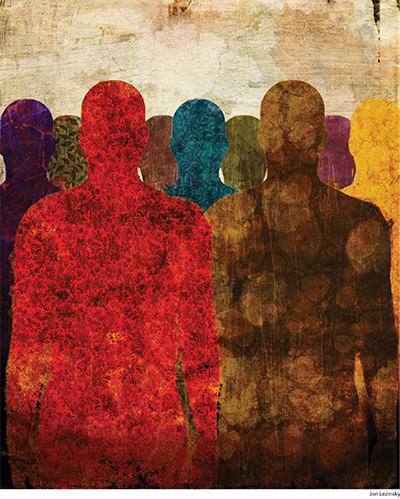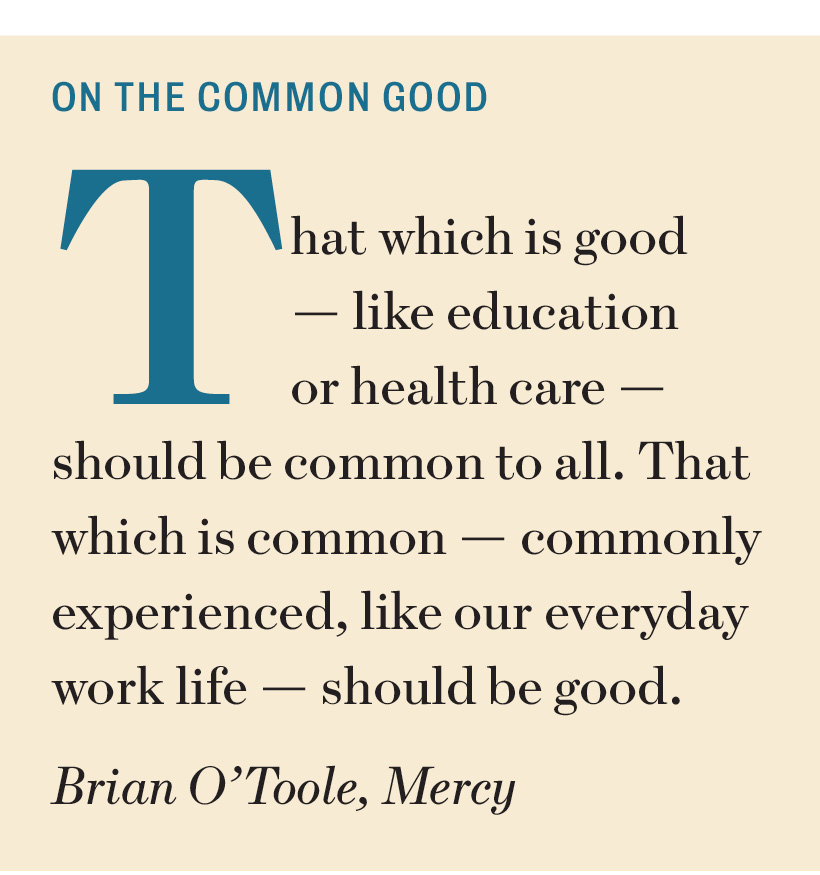BY: FR. CHARLES BOUCHARD, OP, STD

Jon Lezinsky
Diversity is one of the hallmarks of our age. We hire and promote for diversity. Corporations have chief diversity officers, and they set diversity goals for their senior executives. We train our associates for cultural competency so that they can relate to our patients with greater sensitivity. In many ways, diversity is like Mom and apple pie — who could be against it?
Yet diversity poses real challenges. For instance, how do we reconcile diversity with the common good and solidarity, which focus on what unites us rather than what distinguishes us from one another? After human dignity itself, the common good is the most important principle of Catholic social teaching. In fact, it is impossible to protect human dignity or to achieve human happiness without it. This is because we don't exist in solitary bubbles, isolated from one another. We are essentially social. The common good is the soil in which human society grows.
What's more, the common good is the foundation and purpose of political life (although it would be hard to demonstrate that on the basis of American politics today). Aristotle said it should guide our pursuit of individual goods, since it is a higher and more noble end than goods of individual persons.
Unfortunately, this kind of thinking is not prevalent in the United States. A generation ago, sociologist Robert Bellah and his colleagues, echoing Alexis de Tocqueville's early 19th century observations of American culture, noted that Americans far prefer "I" language to "we" language. We opt for individual striving almost every time.
Is diversity just a more politically correct term for individualism? Is it possible to promote pluralism and also create a cohesive society? Diversity means different things to different people; is it just about race, or does it include culture, economic status and geography?1
We are beginning to realize that disparity in health status and health care outcomes are products of diversity. Diversity challenges the status quo and raises questions about established areas of privilege. Greater awareness of diversity has generated tension and even violence in some of our cities.
UNEASINESS ABOUT DIVERSITY
These challenges have not gone unnoticed. One 2016 presidential candidate gained a following partly by criticizing political correctness. He named — and harnessed — the unease that some Americans feel about the increasingly diverse world in which they live. "Make America great again" means, at least in part, "Make America look like me again." The candidate and his supporters want to restore the "real" America by restricting immigration and stepping back from international involvement.
There are some Catholic thinkers who reject the idea of diversity. Wolfgang Grassl, PhD, is a professor at St. Norbert's College in Wisconsin. In 2013, he wrote an article entitled "Diversity is Not a Catholic Value." He sees it largely as an academic fad, "mostly as a substitute for true religion." He laments the growth of diversity studies, diversity advisers, recruitment programs geared to "diverse students" and even sensitivity training. He says the quest for diversity is inevitably a zero-sum game in which some of the (current) players are forced out and replaced with new players. He suggests that it is akin to ethnic cleansing.

Grassl fears that too much emphasis on diversity will inevitably lead to relativism. He says, "The destructive quest for artificial diversification is an outgrowth of the scourge of the 20th century — the all-pervasive creed of relativism."
I disagree with him here, but I do see how diversity could be misunderstood to relativize all experience and culture so that there is no "we," no common set of values and no common narrative. This can be a particular problem for us in Catholic health care if the search for diversity undermines our identity as a Catholic ministry. Identity and diversity are not mutually exclusive.
INDIVIDUAL INTERESTS
Another problem with diversity is that it sometimes sounds like a declaration of individualism: "This is who I am. I am unique, and I am going to live my life as I choose."
This is the point of most political protest today. Special-interest groups form to make it clear that they are different, and that their needs are distinct from those of other groups. This is one aspect of the individualism that characterizes America generally. Individual interests are not bad, but we should be wary of promoting them at the cost of social unity. Experience in other countries — including Belgium, the Balkans, the Middle East and much of Africa — has shown that identity politics makes it very hard to establish a cohesive society.
Perhaps the biggest problem with diversity initiatives is that they sometimes give the impression that diversity is something we create. If that were true, we'd be in control. We could manage it and let it out a little at a time. But polarization and political conflict show diversity can be difficult or impossible to manage. This is because diversity is not our creation; it is a given. The world and the world's people are diverse, just the way God created them.2
As Rabbi Jonathan Sacks, PhD, says in his marvelous book The Dignity of Difference: "The one God, creator of diversity, commands us to honour his creation by respecting diversity."3 It is, he says, a divine blessing at the core of our sociality.
What we face today is not creating a diverse world, but discovering and acknowledging it. But then what? What if we do begin to grasp the full range of God's glory in the diversity of human life? What do we make of this astonishing fact?
THE COMMON GOOD
The common good is part of the answer. It is a set of conditions that enable human flourishing by providing things all of us need, but that none of us is able to achieve on our own.
In the Middle Ages, Thomas Aquinas "baptized" the common good so that it was not just a political and social concept, but a theological one. In addition to being an indispensable condition for human flourishing, we now understand the common good as an eschatological reality that foreshadows the reign of God. To the extent that we achieve the common good, here and now, we are glimpsing our ultimate destiny.
The common good is an essential companion to diversity, for it uses diversity to weave a social fabric. Far from suppressing or homogenizing difference, the common good creates a place for diversity in its set of social, cultural and economic circumstances that provide fertile ground for everyone. It does not sacrifice individuals to the whole. Rather, it maximizes participation, creates common purpose and assures that social and economic benefits flow back upon individuals.
This is important to us in health care since we want to respect the autonomy, dignity and difference of the individual patients we treat. But we also want to reduce disparities, enhance the health of all through population health and provide relatively equitable distribution of health care resources.
The common good doesn't come about by accident. It is the result of intentional effort by persons who possess the virtue of solidarity, or the ability to understand and feel that we share a common humanity and destiny with persons who are socially, economically, geographically or culturally distant from us. Solidarity is the glue that holds us together as a society. It enables us to acknowledge and respect difference and yet act as though unity and common purpose are real and possible. Solidarity results in an interdependence that draws us together.
"Clearly, man by nature is a gregarious animal born for cultivating society with other[s] …. [For this reason] God distributed his gifts unevenly … God therefore willed that each need the service and aid of others in order that friendship would bind all together, and no one would consider another to be valueless."4
Another way of talking about solidarity is to describe it as a covenant.
Sacks says, "Covenant is a bond, not of interest or advantage, but of belonging. Covenants are made when two or more people come together to create a 'We.' … Covenantal relationships — where we develop the grammar and syntax of reciprocity, where we help others and they help us without calculations of relative advantage — are where trust is born."5
"What makes covenant a concept for our time," Sacks says, "is that it affirms the dignity of difference."6
Even if diversity is, at times, frightening because it is out of our control, solidarity and covenant use diversity to continue God's creative act.
THE ULTIMATE GIFT OF UNITY
Catholic health care is in a unique position to honor diversity. We see it as a gift from God, but we also know that it is not God's last word. Even as we recognize God's glory in the diversity of peoples, we know that God calls all of this diversity back to himself, for in the end, he himself is our ultimate Common Good. This doesn't mean that we will be absorbed into some big divine blob, but that with our varying gifts, we assist one another in this life and prepare ourselves for the ultimate gift of unity in God.
The Dominican Sisters of Springfield, Illinois, went to Mississippi and purchased Jackson Infirmary in the 1940s to found St. Dominic's Hospital. When they got there, they discovered segregated hospital wards and different standards of care for white and black patients. They knew they couldn't do much about segregation, but they did what they could by creating a single standard of care so that black and white patients were treated exactly the same. Like all of our founders, these sisters were motivated not just by charity, but by a belief in the common good. They welcomed everyone who came to them, but they always "pulled toward the middle" as they tried to create a more just and equitable society. They provided quality care while they were also working to transform society.
How will we continue to do that today?
FR. CHARLES BOUCHARD, OP, is senior director, theology and ethics, the Catholic Health Association, St. Louis.
NOTES
- A 2006 article describes four "layers" of diversity: ) personality; 2) internal dimensions (e.g., gender, country of origin, race, physical ability); 3) external dimensions (e.g., religion, parental status, recreational habits, geographical location); and 4) organizational dimensions (e.g., management occupation, department, specialty). Jan Salisbury, M.S., and Sam Byrd, "Why Diversity Matters in Health Care," CSA Bulletin (California Society of Anesthesiologists), Spring 2006.
- The creation accounts in Scripture go to great lengths to make this clear. God created a great diversity of creatures, not just one. Scripture emphasizes repeatedly that the world is bigger than we think.
- Jonathan Sacks, The Dignity of Difference: How to Avoid the Clash of Civilizations (London: Continuum, 2002) 200.
- Sacks, Dignity, quoting 16th-century jurist Johannes Althusius, 101.
- Sacks, Dignity, 151.
- Sacks, Dignity, 203.